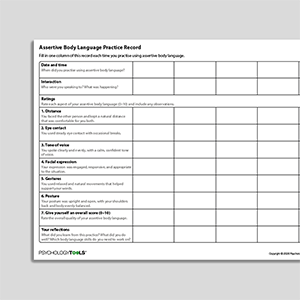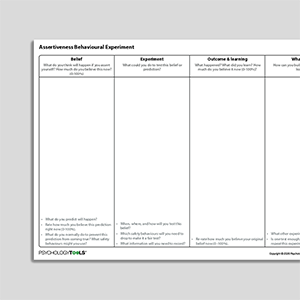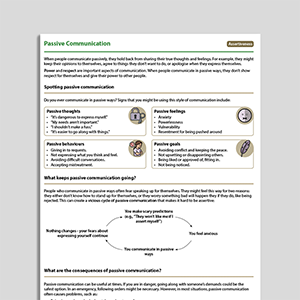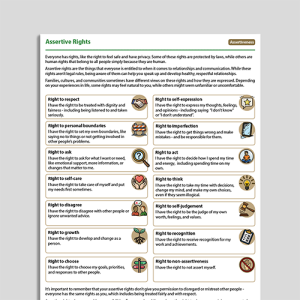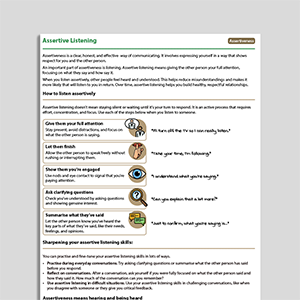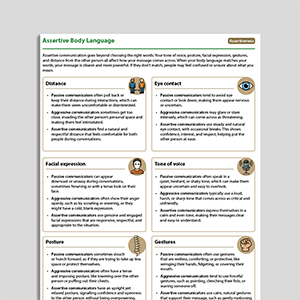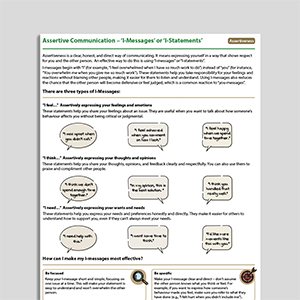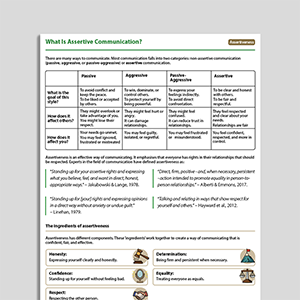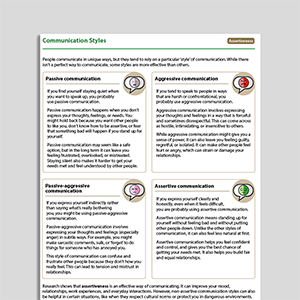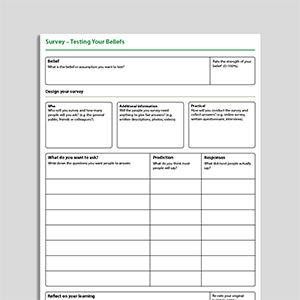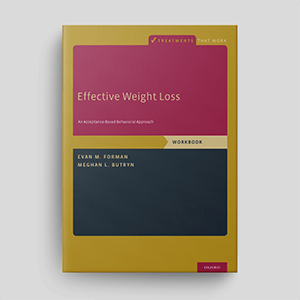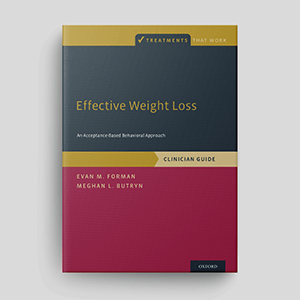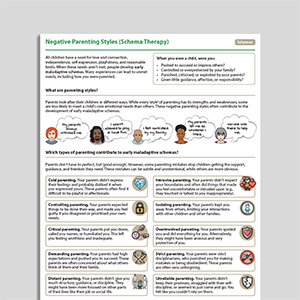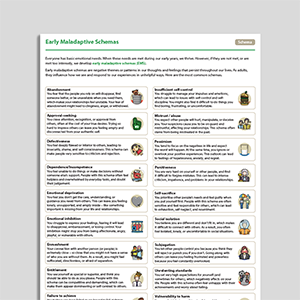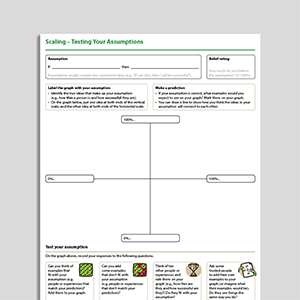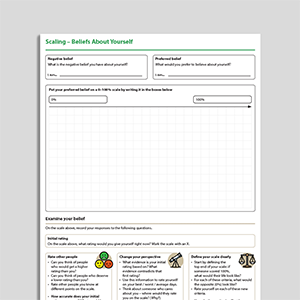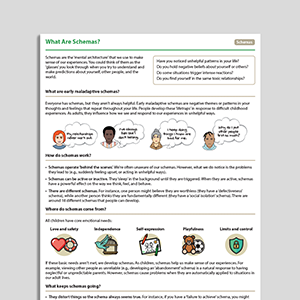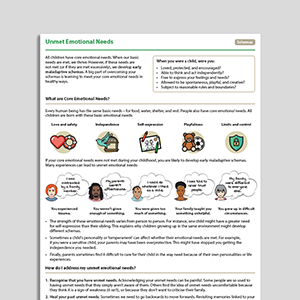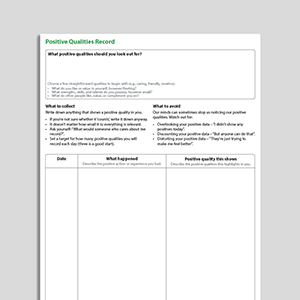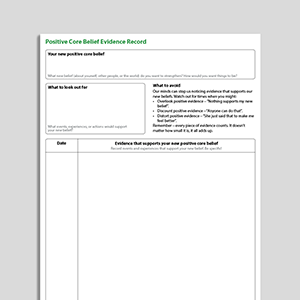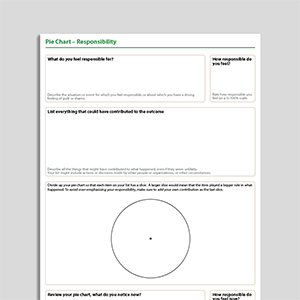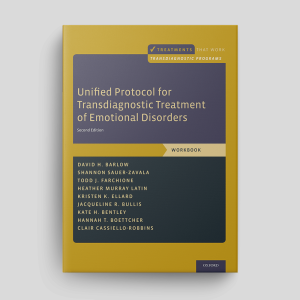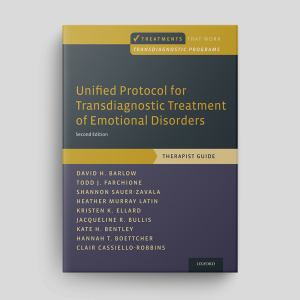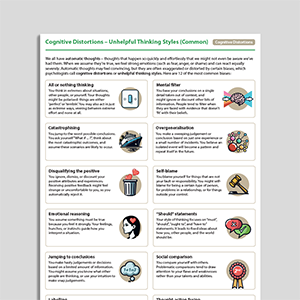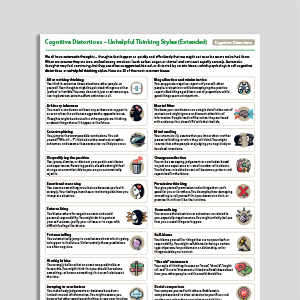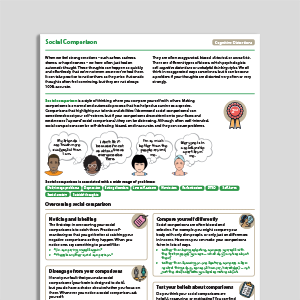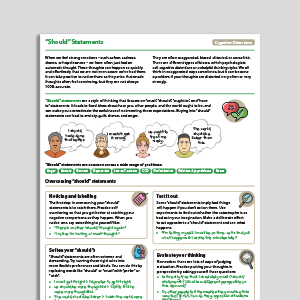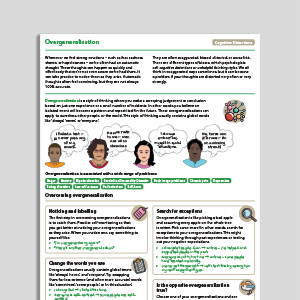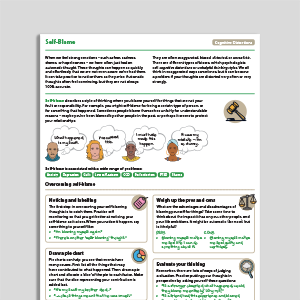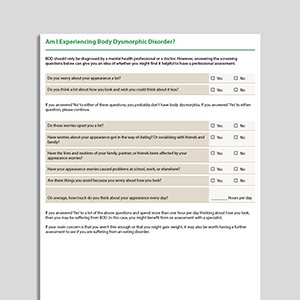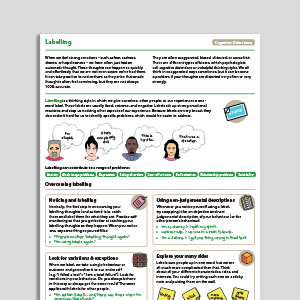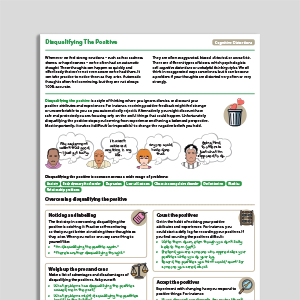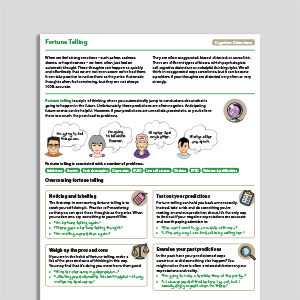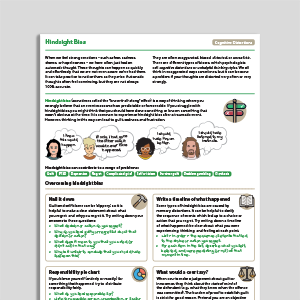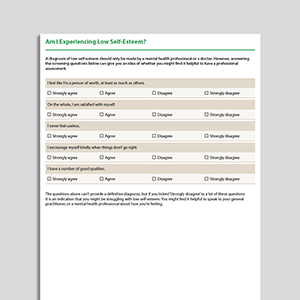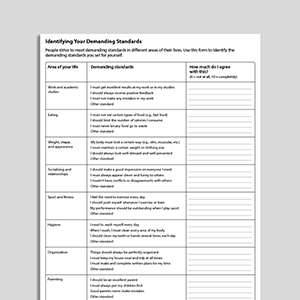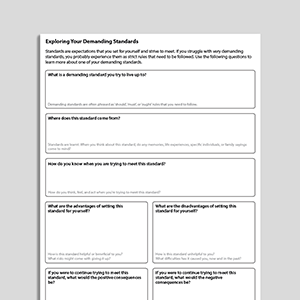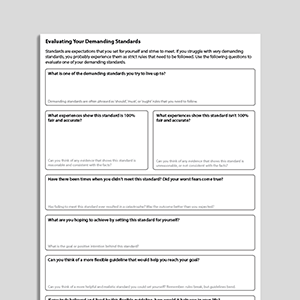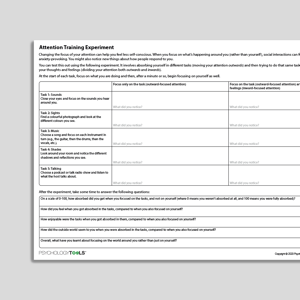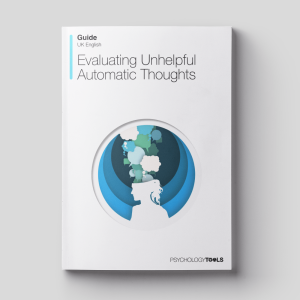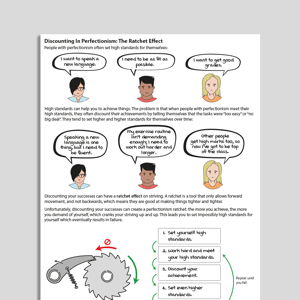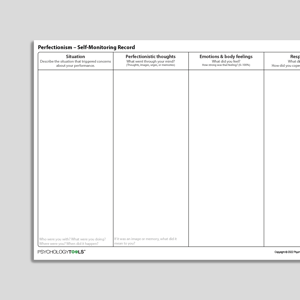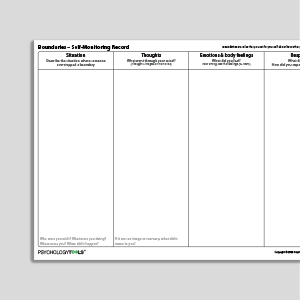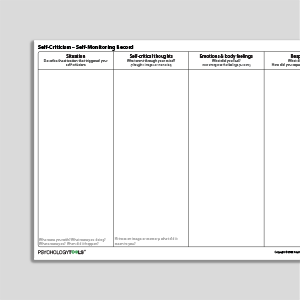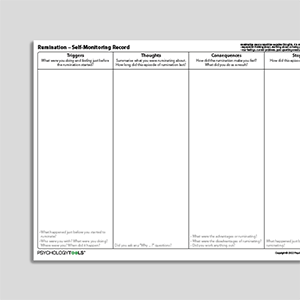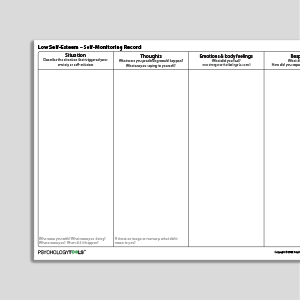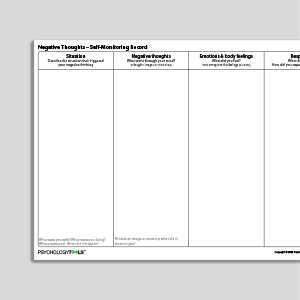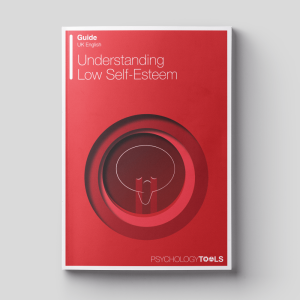Self-Esteem and Self-Criticism Worksheets & Exercises
Self-esteem is the degree to which we evaluate ourselves positively. It refers to a person’s global appraisal of his or her value based upon the scores that persons gives themselves in different roles and domains of life (Harter, 1999; Markus & Nurius, 1986; Rogers, 1981). Low self-esteem does not appear as a separate diagnostic category in either the DSM-5 or ICD-10, although it is associated with a wide range of mood and anxiety disorders including depression and social anxiety. There are two cognitive behavioral models of self-esteem that clinicians will find provide useful therapeutic interventions. Psychology Tools has a range of self-esteem exercises.
Showing 1 to 50 of 66 results
Assertiveness Behavioral Experiment
Assertiveness Behavioral Experiment
Assertive Communication – 'I-Messages' Or 'I-Statements'
Assertive Communication – 'I-Messages' Or 'I-Statements'
What Is Assertive Communication?
What Is Assertive Communication?
Manage Your Mind: The Mental Fitness Guide (Third Edition)
Manage Your Mind: The Mental Fitness Guide (Third Edition)
Effective Weight Loss: An Acceptance-Based Behavioral Approach: Workbook
Effective Weight Loss: An Acceptance-Based Behavioral Approach: Clinician Guide
Effective Weight Loss: An Acceptance-Based Behavioral Approach: Clinician Guide
Negative Parenting Styles (Schema Therapy)
Negative Parenting Styles (Schema Therapy)
Early Maladaptive Schemas
Early Maladaptive Schemas
Scaling - Testing Your Assumptions
Scaling - Testing Your Assumptions
Scaling - Beliefs About Yourself
Scaling - Beliefs About Yourself
Positive Core Belief Evidence Record
Positive Core Belief Evidence Record
Unified Protocol for Transdiagnostic Treatment of Emotional Disorders (Second Edition): Client Workbook
Unified Protocol for Transdiagnostic Treatment of Emotional Disorders (Second Edition): Client Workbook
Unified Protocol for Transdiagnostic Treatment of Emotional Disorders (Second Edition): Therapist Guide
Unified Protocol for Transdiagnostic Treatment of Emotional Disorders (Second Edition): Therapist Guide
Cognitive Distortions – Unhelpful Thinking Styles (Common)
Cognitive Distortions – Unhelpful Thinking Styles (Common)
Cognitive Distortions – Unhelpful Thinking Styles (Extended)
Cognitive Distortions – Unhelpful Thinking Styles (Extended)
Am I Experiencing Body Dysmorphic Disorder (BDD)?
Am I Experiencing Body Dysmorphic Disorder (BDD)?
Disqualifying The Positive
Disqualifying The Positive
Audio Collection: Psychology Tools For Developing Self-Compassion
Audio Collection: Psychology Tools For Developing Self-Compassion
Am I Experiencing Low Self-Esteem?
Am I Experiencing Low Self-Esteem?
Identifying Your Demanding Standards
Identifying Your Demanding Standards
Exploring Your Demanding Standards
Exploring Your Demanding Standards
Evaluating Your Demanding Standards
Evaluating Your Demanding Standards
Evaluating Unhelpful Automatic Thoughts
Evaluating Unhelpful Automatic Thoughts
Discounting In Perfectionism – The Ratchet Effect
Discounting In Perfectionism – The Ratchet Effect
Perfectionism Self-Monitoring Record
Perfectionism Self-Monitoring Record
Boundaries - Self-Monitoring Record
Boundaries - Self-Monitoring Record
Self-Criticism - Self-Monitoring Record
Self-Criticism - Self-Monitoring Record
Rumination - Self-Monitoring Record
Rumination - Self-Monitoring Record
Low Self-Esteem - Self-Monitoring Record
Low Self-Esteem - Self-Monitoring Record
Negative Thoughts - Self-Monitoring Record
Negative Thoughts - Self-Monitoring Record
Understanding Low Self-Esteem
Understanding Low Self-Esteem
Links to external resources
Psychology Tools makes every effort to check external links and review their content. However, we are not responsible for the quality or content of external links and cannot guarantee that these links will work all of the time.
Assessment
-
Rosenberg Self-Esteem Scale (Rosenberg, 1965)
| Rosenberg | 1965
- Scale
Exercises
- Group exercises for improving self esteem
Guides and workbooks
- Combating self-criticism
- Building Self-Esteem – A Self-Help Guide | SAMHSA
- Self-esteem: Boosting your self-esteem | Donna Gilroy | 2004
- Issues with self-esteem? | Wellbeing Services South Glasgow
- How to increase your self-esteem | Beth Murphy, Sam Challis, Mind | 2013
Information Handouts
-
Low Self-Esteem (Information Handouts)
| Centre For Clinical Interventions
- What Is Low Self-Esteem?
- How Low Self-Esteem Begins
- How Low Self-Esteem Is Maintained
- Acknowledging Your Positives
- Negative Self-Evaluations
- Adjusting Negative Core Beliefs
- Adjusting Rules and Assumptions
- Overcoming Biased Expectations
- Healthy Self-Esteem
- What Is Self-Compassion? | Centre For Clinical Interventions
- How to nurture your child’s self esteem | CFERT
Information (Professional)
- Being assertive (OCTC Practical Guides) | Helen Kennerley | 2016
Self-Help Programmes
-
Building Self-Compassion (Workbook)
| Centre For Clinical Interventions | 2017
- Module 1: Understanding Self-Compassion
- Module 2: Barriers To Self-Compassion
- Module 3: Preparing For Self-Compassion
- Module 4: Compassionate Imagery
- Module 5: Self-Compassionate Thinking
- Module 6: Self-Compassionate Behavior
- Module 7: Self-Compassionate Living
-
Improving Self-Esteem (Workbook)
| Centre For Clinical Interventions | 2005
- Module 1: What Is Low Self-Esteem
- Module 2: How Low Self-Esteem Develops
- Module 3: How Low Self-Esteem Is Maintained
- Module 4: Biased Expectations
- Module 5: Negative Self-Evaluations
- Module 6: Accepting Yourself
- Module 7: Adjusting Rules & Assumptions
- Module 8: Developing Balanced Core Beliefs
- Module 9: Healthy Self-Esteem
-
Caring Less About Your Looks
| Centre For Clinical Interventions | 2019
- Module 1: The Impact Of Appearance Overconcern
- Module 2: What Keeps Appearance Concerns Going
- Module 3: Appearance Focused Attention
- Module 4: Body Checking And Reassurance Seeking
- Module 5: Appearance Altering Behaviors
- Module 6: Avoidance And Safety Behaviors
- Module 7: Overvaluing Appearance And Self-Management Planning
Worksheets
- Cognitive Interpersonal Cycle Worksheet | Stirling Moorey | 2007
-
Low Self-Esteem (Worksheets)
| Centre For Clinical Interventions
- How Low Self-Esteem Begins
- How Low Self-Esteem Is Maintained
- Positive Qualities Record
- Positive You Journal
- Adjusting Core Beliefs
- Challenging Biased Expectations
- Experimenting with Biased Expectations
- Thought Diary For Negative Self-Evaluations
- Adjusting Rules and Assumptions
- Healthy Self-Esteem
Recommended Reading
CBT approach
- McManus, F., Waite, P., & Shafran, R. (2009). Cognitive-behavior therapy for low self-esteem: a case example. Cognitive and Behavioral Practice, 16(3), 266-275
COMET approach
- Staring, A. B. P., van den Berg, D. P. G., Cath, D. C., Schoorl, M., Engelhard, I. M., & Korrelboom, C. W. (2016). Self-esteem treatment in anxiety: A randomized controlled crossover trial of Eye Movement Desensitization and Reprocessing (EMDR) versus Competitive Memory Training (COMET) in patients with anxiety disorders. Behaviour research and therapy, 82, 11-20
- Korrelboom, K., Marissen, M., & van Assendelft, T. (2011). Competitive memory training (COMET) for low self-esteem in patients with personality disorders: A randomized effectiveness study. Behavioural and Cognitive Psychotherapy, 39(01), 1-19
- Korrelboom, K., de Jong, M., Huijbrechts, I., & Daansen, P. (2009). Competitive memory training (COMET) for treating low self-esteem in patients with eating disorders: A randomized clinical trial. Journal of consulting and clinical psychology, 77(5), 974
- Korrelboom, K., van der Weele, K., Gjaltema, M., & Hoogstraten, C. (2009). Competitive memory training for treating low self-esteem: A pilot study in a routine clinical setting. The Behavior Therapist.
- Brewin, C. R. (2006). Understanding cognitive behaviour therapy: A retrieval competition account. Behaviour research and therapy, 44(6), 765-784
CBT approach
- Fennell, M. J. V. (2004). Depression, low self-esteem, and mindfulness. Behaviour Research and Therapy, 42, 1053-1067
- Fennell, M. J. V. (1998). Cognitive therapy in the treatment of low self-esteem. Advances in Psychiatric Treatment, 4, 296-304
- Fennell, M. J. (1997). Low self-esteem: A cognitive perspective.Behavioural and Cognitive Psychotherapy,25(1), 1-26.
- Markus, H., & Nurius, P. (1986). Possible selves.American Psychologist,41(9), 954.
What Is Low Self-Esteem?
Signs and Symptoms of Low Self-Esteem
Low self-esteem can be associated with the following behaviors or experiences:high levels of self-criticism
ignoring or downplaying positive qualities
comparison of self to others and negative self-judgment
use of negative words to describe self
dismissal of positive achievements as ‘luck’ or ‘fluke’
difficulty accepting compliments
Psychological Models and Theory of Low Self-Esteem
Melanie Fennell published a cognitive behavioral protocol for low self-esteem in 1997. The model is grounded in Aaron Beck’s cognitive model of emotional disorders. It assumes that, based upon what they have experienced, people form beliefs or assumptions about themselves, others, and the world. When activated, these beliefs and assumptions give rise to negative automatic thoughts which in turn lead to negative affect, and behavior. Fennell describes a self-perpetuating vicious circle whereby negative thoughts lead to painful affect and self-defeating behaviors such as avoidance or withdrawal, which act to maintain and reinforce the thoughts and underlying beliefs.Kees Korrelboom has developed a protocol for increasing self-esteem through a program of Competitive Memory Training (COMET: Korrelboom, van der Weele, Gjaltema, & Hoogstraten; 2009; Korrelboom, de Jong, Huijbrechts, & Daansen, 2009; Korrelboom, Maarsingh, & Huijbrechts, 2012). The COMET protocol is intended for people who know that their negative self-judgment is too severe but who nevertheless continue to view themselves negatively. The model draws upon Brewin’s retrieval competition theory of memory (Brewin, 2006, 2015) where information to be retrieved ‘competes’ for attention. A less accurate negative version of the self (e.g.,‘I’m pathetic’) might ‘win’ a competition against an alternative view (‘I’m kind and competent’) by nature of being reinforced/practiced. COMET aims to assist accurate views of the self to ‘win’ the retrieval competition by systematically building up and rehearsing an accurate view of the self.Evidence-Based Psychological Approaches for Working with Low Self-Esteem
Cognitive behavioral interventions for low self-esteem have been tested in a number of small trials and indicate generally favorable results (Hall & Tarrier, 2003; Morton, Roach, Reid, & Stewart, 2012; Waite, McManus, & Shafran, 2012).The COMET protocol has been used to improve self-esteem in a variety of conditions including depression, eating disorders, personality disorders, and schizophrenia. The trials indicate generally positive results with medium to large effect sizes on indices of self-esteem (Korrelboom et al., 2009, 2009, 2012).Resources for Working with Low Self-Esteem
Psychology Tools resources available for working therapeutically with low self-esteem include:psychological models of low self-esteem
information handouts for low self-esteem
self esteem exercises
References
Brewin, C. R. (2006). Understanding cognitive behaviourtherapy: A retrieval competition account. BehaviourResearch and Therapy, 44(6), 765–784.
Brewin, C. R. (2015). Reconsolidation versus retrieval competition: Rival hypotheses to explain memory change in psychotherapy. Behavioral and Brain Sciences, 38, e4. doi: 10.1017/S0140525X14000144
Fennell, M. J. V. (1997). Low self-esteem: A cognitive perspective. Behavioral and Cognitive Psychotherapy, 25(1), 1–26.
Hall, P. L., & Tarrier, N. (2003). The cognitive-behavioral treatment of low self-esteem in psychotic patients: A pilot study. BehaviourResearch and Therapy, 41(3), 317–332.
Harter, S. (1999). The construction of the self: A developmental perspective. New York: Guilford Press.
Korrelboom, K., van der Weele, K., Gjaltema, M., & Hoogstraten, C. (2009). Competitive memory training for treating low self-esteem: A pilot study in a routine clinical setting. The Behavior Therapist,32, 3–8.
Korrelboom, K., de Jong, M., Huijbrechts, I., & Daansen, P. (2009). Competitive memory training (COMET) for treating low self-esteem in patients with eating disorders: A randomized clinical trial. Journal of Consulting and Clinical Psychology,77(5), 974–980.
Korrelboom, K., Maarsingh, M., & Huijbrechts, I. (2012). Competitive memory training (COMET) for treating low self‐esteem in patients with depressive disorders: A randomized clinical trial.Depression and Anxiety, 29(2), 102–110.
Markus, H., & Nurius, P. (1986). Possible selves. American Psychologist, 41(9), 954–969.
Morton, L., Roach, L., Reid, H., & Stewart, S. H. (2012). An evaluation of a CBT group for women with low self-esteem.Behavioral and Cognitive Psychotherapy,40(2), 221–225.
Rogers, T. B. (1981). A model of the self as an aspect of the human information processing system. In N. Cantor & J. F. Kihlstrom (Eds.), Personality, cognition, and social interaction(pp. 193–213). Hillsdale, NJ: Erlbaum.
Waite, P., McManus, F., & Shafran, R. (2012). Cognitive behaviourtherapy for low self-esteem: A preliminary randomized controlled trial in a primary care setting. Journal of Behavior Therapy and Experimental Psychiatry, 43(4), 1049–1057.
